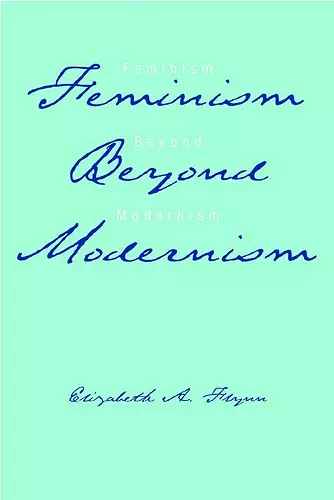Feminism Beyond Modernism
Format:Paperback
Publisher:Southern Illinois University Press
Published:30th Jun '02
Currently unavailable, and unfortunately no date known when it will be back

Misunderstanding and denigration of postmodern feminism are widespread Elizabeth Flynn's Feminism Beyond Modernism comes to its defense in a cogent and astute manner by first distinguishing between postmodern and antimodern feminisms and then reclaiming postmodern feminism by reconfiguring its relationship to modernism. Too often postmodern feminism is unfairly identified as opposed to modernism and associated with subjectivism and relativism. Flynn addresses these problems by provisionally defining postmodern feminism as problematizing and critiquing modernism without directly opposing it. Flynn also suggests that feminist traditions that reject modernism, such as radical and cultural feminisms, are antimodern rather than postmodern. In this interdisciplinary study, Flynn defines feminist traditions broadly, situating her discussions within the contexts of literary studies and rhetoric and composition while simultaneously exploring the troubled relationship between these fields. Departing from accepted definitions of modernism, Flynn distinguishes between aesthetic modernism and Enlightenment modernism and uses the work of John Locke, Sigmund Freud, Charlotte Perkins Gilman, Michel Foucault, Donna Haraway, and others as benchmarks for historical placement. In addition, rereadings of works by Virginia Woolf, Adrienne Rich, Alice Walker, Louise Rosenblatt, and others demonstrate the complex ways in which they respond to modernist pressures and tendencies. From this context, Flynn's Feminism Beyond Modernism reconfigures feminist traditions by defining postmodern feminism as a critique of modernism rather than as an antimodern opponent.
Elizabeth Flynn offers readers a triple treat: an even-handed sorting out of important strands of feminist thought that manages to avoid reductionism; a compelling vision of post-modern feminisms as dynamic, multiple, and transformative; and a bracing account of how to relate theoretical concepts and pedagogical practices. This is a book that calls for intense conversation, as well as one that points the way toward future feminist projects.-Andrea A. Lunsford, Stanford University
ISBN: 9780809324354
Dimensions: 228mm x 133mm x 13mm
Weight: 333g
272 pages